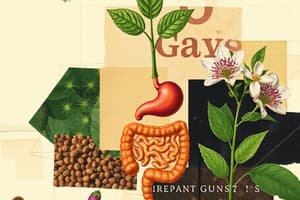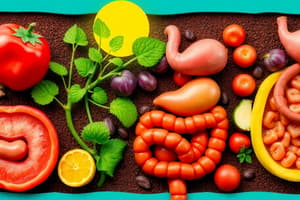Podcast
Questions and Answers
What is the role of enzymes in the digestive process of animals?
What is the role of enzymes in the digestive process of animals?
- To absorb nutrients from the digestive tract
- To mechanically break down food
- To transport nutrients to different organs
- To facilitate the chemical breakdown of food (correct)
Which organ in animals plays a crucial role in the mechanical breakdown of food?
Which organ in animals plays a crucial role in the mechanical breakdown of food?
- Liver
- Teeth (correct)
- Kidney
- Intestines
In animal digestion, what happens once food is broken down into its constituent nutrients?
In animal digestion, what happens once food is broken down into its constituent nutrients?
- The body absorbs these nutrients from the digestive tract (correct)
- The nutrients are transported to the lungs
- The body excretes the nutrients
- The nutrients are stored in the liver
What is the primary function of plants in the ecosystem in relation to nutrition?
What is the primary function of plants in the ecosystem in relation to nutrition?
Where does absorption mainly occur in animals?
Where does absorption mainly occur in animals?
What is the indigestible material eliminated from the body known as?
What is the indigestible material eliminated from the body known as?
What process do plants use to convert sunlight, carbon dioxide, and water into glucose and oxygen?
What process do plants use to convert sunlight, carbon dioxide, and water into glucose and oxygen?
Which nutrient is primarily responsible for regulating water balance and enzyme activity in plants?
Which nutrient is primarily responsible for regulating water balance and enzyme activity in plants?
What is the main function of nitrogen in plants?
What is the main function of nitrogen in plants?
How do animals obtain nutrients from plants?
How do animals obtain nutrients from plants?
Flashcards are hidden until you start studying
Study Notes
Unlocking the Secrets of Nutrition: Exploring Digestion in Animals and Plant Nutrition
When it comes to the fascinating world of nutrition, we delve into the realms of both animal and plant life to understand how organisms acquire the nutrients they need to thrive. Here, we'll explore the intricate processes of digestion in animals and the vital role of plants in supplying nutrients to the entire ecosystem.
Digestion in Animals
Digestion, the process by which animals break down food into nutrients they can absorb, is a marvel of biological efficiency. From their first encounter with food to the final extraction of nutrients, animals navigate a complex journey involving specialized organs and enzymes.
-
Mechanical breakdown: Animals use their teeth to mechanically break down food, and their digestive tract also plays a crucial role. The mechanical action of muscles in the gastrointestinal tract, such as the stomach churning and the intestines peristalsis, breaks up the food further.
-
Chemical breakdown: Animals produce enzymes, proteins that act as biological catalysts, to facilitate the chemical breakdown of food into simpler, absorbable components. Enzymes work at optimal temperatures and pH levels in specialized organs such as the stomach and the pancreas.
-
Absorption: Once food is broken down into its constituent nutrients, the body absorbs these nutrients from the digestive tract. Absorption occurs mainly in the small intestine, where nutrients pass through the intestinal wall and enter the bloodstream.
-
Excretion: After nutrients have been absorbed, the remaining indigestible material, known as feces, is eliminated from the body via the rectum and anus.
Animals rely on the nutrients absorbed from their diet to support their metabolic and physiological processes, growth, and reproduction. The efficiency by which animals break down and absorb nutrients can have a significant impact on their health and overall fitness.
Nutrition in Plants
While animals obtain their nutrients through digestion, plants acquire them through the process of photosynthesis, where they convert sunlight, carbon dioxide, and water into glucose and oxygen. Plants absorb nutrients from the soil, primarily through their root systems, and use these nutrients to grow, reproduce, and perform metabolic processes.
Plants require a variety of essential nutrients, such as:
- Nitrogen, for building proteins, enzymes, and nucleic acids
- Phosphorus, for energy transfer and DNA synthesis
- Potassium, for regulating water balance and enzyme activity
- Calcium, for cell wall strength and enzyme activation
- Magnesium, for chlorophyll synthesis
These elements, along with many others, are essential for plant health and growth. Plants' ability to absorb nutrients from the soil and convert them into energy and biomass is fundamental to the food chain, enabling animals to obtain nutrients through the consumption of plants.
In conclusion, understanding the intricate processes of digestion in animals and the vital role of plants in supplying nutrients is crucial for unlocking the secrets of nutrition. This knowledge can enrich our appreciation for the complex and interconnected systems that sustain life on Earth.
Studying That Suits You
Use AI to generate personalized quizzes and flashcards to suit your learning preferences.




